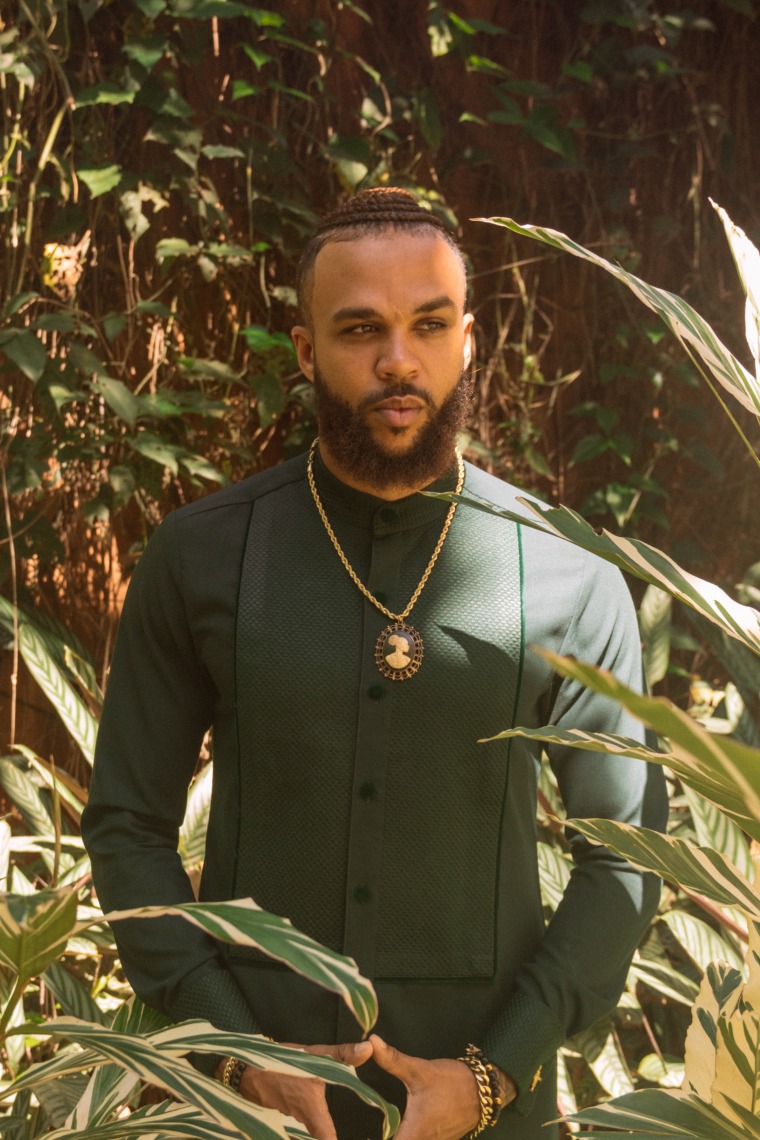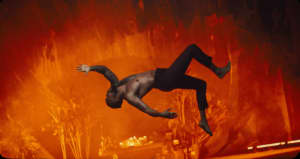
Sitting in the Soho Grand Hotel, Jidenna is well-dressed as expected, sipping on tea with whiskey to calm his nerves from the eventual rollout of his second studio album 85 to Africa. When I bring up topics of a post-racial society, religion, and his journeys in Africa, he's careful and deliberate with his words — a culture nerd who can also be the life of a party. During our discussion, I reflected on the duality of someone who can make Billboard-charting pop singles but also dedicate a song to interracial marriages in America.
How are you feeling about your new album?
I'm proud about it. The first album was a good showcase, but I did so much promo just to break in. I published one song, it was a hit, and everybody wanted to talk to me. It's difficult to balance. Lil Nas X has handled it with grace and finesse, he played it right. Cardi B did well.
What took place in your life between the last album and this new one?
In 2017, we leased this big-ass rapper mansion in Atlanta to do album one and two. I get a knock on the master bathroom door — I know it's my homie's knock. I open the door and he's standing there with four police officers, and he just says, "We have a problem." I thought we might be getting raided or framed, to be honest, but the officers were like, "You're being evicted, you can get your medicine bag." Growing up, my neighbors would get evicted in the neighborhoods I was at, so I've seen other people go through it — but not like this, especially when you're paying the lease of, like, a WeWork space.
Apparently, the owner wasn't paying mortgage and didn't let us know, so the house foreclosed and went to auction. The father of the guy who bought it was there and asked his daughter to go get his gun and threatened to shoot my producer while he was trying to get all that shit before it was thrown on the lawn. I grabbed all my hard drives and we pleaded with the sheriff to at least get our studio equipment. They had some mercy, but the family was smiling and smirking. The end of the year, we had a show in South Africa and we ended up staying for half a year.

Was the vision of 85 to Africa something you had in your mind previously?
Since as long as I could remember, I looked at Africa as a holy land — the promised land, the land of power that the world needed to survive. It's the one continent that you can't bomb. You bomb it and everybody dies, because the amount of resources that the world relies upon in Africa is too much. If there was nuclear war, that would be the last continent to go because everybody would know if we bomb that shit we're fucked. Your cell phone, your laptop, your food sources, your chocolate — all that shit is done. Not to mention the amount of people in Africa and the labor force, which to me is the best human resource. We had the title early. It came from my homie Les who was working for Nike in marketing and was living in Johannesburg. He was like, "You know, you can just hop on the 85 and go straight to Africa."
In the visual trailer that you made for this album, you said you wanted to integrate the diaspora into the content.
For black people, there's been a distance between the continent of Africa and then Black Americans — and Caribbean Americans, and even first-generation Africans born here. There's a lot of foreign access on the continent of Africa, and I want Africa to be black-owned, just like South Asia or South America should be brown-owned. Wherever you from, that's your land. It's up to us to plant the flag. We haven't done that well in the last few hundred years, and if we don't do it now, we'll lose the next 500 years. I want us to move our money together, create manufacturing plants, and invest in each other. It'll change the circumstances of which black people live in this country and of Africa, because we in the diaspora have some intel and things of worth to bring — and Africa has plenty of worth to bring us.
How does that help America?
When you're trying to inflate a balloon, you have to use air from the outside. Every single immigrant group has this concept of repatriation and money going back and forth. My boy who's Chinese-American just opened up a tea house in LA. He went to every bank in LA trying to talk about his idea, but no bank was buying it, so he went to a Chinese bank in Chinatown and they gave him a loan. A black person in America doesn't have that opportunity — the capital doesn't exist here yet. It would be very hard for a black person to get that loan. If there's more travel and connection with Africa, then you're getting the capital that's coming from Africa, so you can actually get that loan.
We're the style icons of the world, but none of this shit is manufactured by black people. There's no power in that. You have to have the means to the end, this is where true wealth comes from. You need to own that shit — actual true wealth creation. It starts with the psychology that our worth is determined by whether or not we value ourselves. If you think you don't have no culture, or you were just a slave, or you from Africa but you ashamed, you're never going to have a place in the economy.
I saw on Instagram that one of your life goals was to know at least one prayer in every major religion in the world. How far along are you?
I've touched every religion that is major. Buddhism, Hinduism, Islam, Christianity, Judaism.
They're different prayers. I don't have an attachment to the prophet of each religion. I had a spiritual experience in college. I was struggling with my mental health, and I got to a point where I was suicidal and wanted to jump off a balcony. I remember thinking, "Nobody knows me, what's the point of living, I'm never going to make it in music, fuck it." In that moment, something came to me, man — a spirit in my mind that was like, "Nobody knows me, but God knows me." As soon as my mind heard that, my knees dropped to the floor. I tried to stand up and I was hammered again to the floor, my arms stretched back. Everything turned black, and I felt like I was in this black ocean. There was a voice inside telling me why I should stay on Earth. When I came out of it, my shirt was drenched as if I'd been in the ocean.That sent me on a spiritual journey to figure out what the hell happened — I didn't even finish the semester. I went straight to this Tibetan Buddhist temple, I went to a Hindu temple, I went to mosques. That was the beginning of this journey.

Photo: Brooklyn


